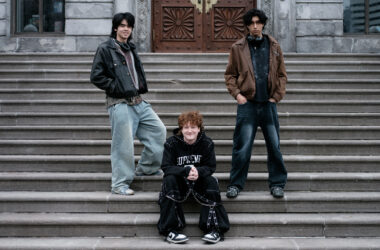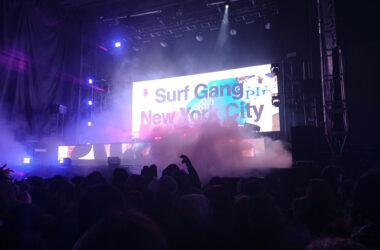The McCord Museum’s ‘After Hours: Slow Fashion’ event on Nov. 21 brought together members of Montreal’s fashion community for a night of celebrating sustainable style. The night’s programming focused on promoting creative and eco-friendly clothing and highlighted creative and ethical alternatives to fast fashion, the inexpensive clothing produced by mass-market retailers to capture current fashion trends. The so-called ‘slow fashion movement’ incorporates natural colours, recycled fabrics, and locally sourced fibres as sustainable options in clothing production.
The evening’s main spectacles were two consecutive fashion shows presented by CÉGEP Marie-Victorin’s School of Fashion. In collaboration with Ardène, the School of Fashion graduates created a line named “Remodeler,” which was on display at the McCord Museum that night. The fashion shows unveiled 20 repurposed fur coats with sustainable consumption and circular creation in mind. The after-hours event also featured pop-up shops that showcased the work of local designers and creatives, all of which incorporated sustainability into their products.
One vendor on display was Once Again, a local fashion collective that aims to educate consumers about the socioeconomic and environmental impacts of the fashion industry. The brand offers three ethical clothing lines, each with its own unique products and solutions. Their ’Nouveau’ line, displayed during the event, features textiles made of organic, natural, and synthetic fibers coloured with a range of natural dyes. Lawrence Lambert, a co-founder of the eco-friendly studio, highlighted the importance of sustainable and ethical fashion practices.
“[The] clothing industry is the second-most polluting industry in the world.” Lambert said. “[Designers] should see [sustainability] as a creative opportunity.”
When asked what motivates the brand’s eco-friendly practices, Lambert mentioned that her design choices are influenced by her passion to make change.
“[Sustainability] nurtures my inner self [by contributing to] something that’s bigger than me,” Lambert said.
Eliza Faulkner, a Canadian fashion designer based in Montreal, also displayed some of her latest designs. Her clothing lines incorporate ultra-feminine dresses and bold use of colour. Faulkner always seeks to be more sustainable in the design and manufacturing processes.
“It’s just about making really beautiful clothes that happen to be ethically made,” Faulkner said of her clothing range. “We try to use as many sustainable practices as we can. We manufacture everything in Montreal […] [and] buy a lot of deadstock fabric [and] natural fibres.”
Another unique vendor featured was the up-and-coming resale app Upcycli. This start up, co-founded by Elodie Lourimi and Christopher Montoya, is the first mobile app in Quebec dedicated entirely to the purchase, sale, and “upcycling” of second-hand clothing. Upcycling fashion involves using pre-existing clothing, accessories or other items and transforming them into new garments.
“We launched the app because we want to help people buy [fewer new] clothes,” Christopher Montoya, one of Upcycli’s co-founders, said. “We want to reduce [fast fashion] [and], we want to give a second life to our clothes.
Although Upcycli only operates in Quebec for now, Montaya assured that they hope to expand into other provinces across Canada.
The vendor pop-ups were joined by numerous workshops centred on eco-friendly practices, including stations dedicated to paper-making with recycled fabrics and linen paper spinning. One workshop was led by Mariane Laforest, founder of textile studio Atelier 1n, which offers workshops and creative classes to those interested in learning about natural dyeing and textile design.
“Natural dye[s] are better for the environment because there [are] no chemical products [left] in the water after,” Laforest said.
However, this natural dyeing process can also have negative environmental repercussions.
“Natural dye can also be a problem for the environment because you need to use a lot of water with natural dye” Laforest said.
This unique event was successful in promoting sustainability as an ethical and creative opportunity for designers, as well as inspiring people to search for eco-friendly options when making style choices.










Hello Scott
I love that you wrote an article on this event. Not only does it treat its attendees with fashion shows of beautiful, eco-friendly and sustainable clothing, it also educates about ethical fashion practices and the impact of fashion on the environment. I hope for more events like this in the foreseeable future.
Thanks
Joyce